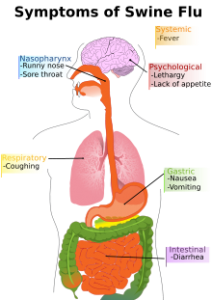The potential risks to human health are the main reasons why so many aspects of the donor animal’s livelihood are being called into question.
The first risk is of course transplant rejection. This can cause the recipient’s immune system to go into overdrive, severely taxing their body and possibly resulting in death.
The next concern is the risk of zoonotic diseases. These could be spread via tissue transfer from the donor animal to the human. As mentioned in Risks to Donor Animal Health, retroviruses like PERVs are a large concern (Bach and Ivinson, 2001; Hansen et al., 2004; Scobie et al., 2013). However, thus far in xenotransplantation experimentation there has been no evidence of PERV transmission, nor of PERV antibodies in patients receiving xenografts (Scobie et al., 2013).

The human symptoms of swine flu are very similar to the porcine symptoms. Both species suffer from diarrhea, lack of appetite and coughing.
http://en.wikipedia.org/wiki/File:PD_Diagram_of_swine_flu_symptoms_EN.svg
Other types of disease transfer such as bacterial and viral infections are also possible. Examples of pathogens carried by pigs include Salmonella species of bacteria and influenza viruses (Hansen et al., 2004). Especially in countries where pig production is a major part of the agriculture industry it may be very difficult, if not impossible, to be completely rid of any kind of porcine infections. Agriculturalists have lots of contact with pigs and pig products so it is still possible for diseases to be exchanged between species, despite stringent regulations on safe work procedures.
The transfer of actual living tissue from pigs to humans will only exacerbate this issue if appropriate production and maintenance procedures are not carefully planned and implemented.

This is such an important topic—staying aware of the many risks to human health helps us make better choices for our well-being. From environmental factors to lifestyle diseases, it’s clear that proactive care is key. I’m glad there are modern treatments available now, like tirzepatide in Placentia, that help people manage health risks more effectively and live healthier lives. Awareness and early action truly make a difference!